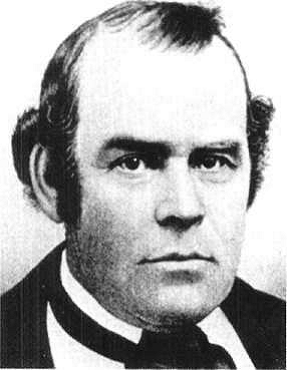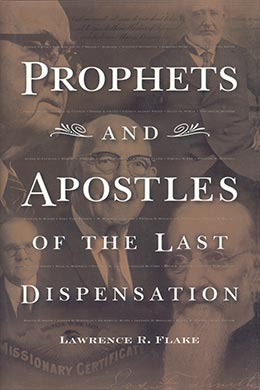Parley Parker Pratt
Lawrence R. Flake, Prophets and Apostles of the Last Dispensation (Provo, UT: Religious Studies Center, Brigham Young University, 2001) 359–62.

Born: 12 April 1807, Burlington, New York
Quorum of the Twelve Apostles: 21 February 1835 (age 27)
Died: 13 May 1857 (age 50), Van Buren, Arkansas
Perhaps no one has left a more impressive description than Parley P. Pratt of the gripping power that reading the Book of Mormon can have on one whose spirit is truly attuned to the Holy Ghost. He wrote: “I read all day; eating was a burden, I had no desire for food; sleep was a burden when the night came, for I preferred reading to sleep. As I read, the spirit of the Lord was upon me, and I knew and comprehended that the book was true, as plainly and manifestly as a man comprehends and knows that he exists. My joy was now full, as it were, and I rejoiced sufficiently to more than pay me for all the sacrifices and toils of my life.” [1]
With this intense fervor, the young convert of twenty-three began his lifelong service to the Lord. He never lost his abundant enthusiasm and overwhelming appreciation for the truths of the gospel. After reading the Book of Mormon, he traveled immediately to Palmyra in search of its translator. Finding the Prophet Joseph absent from his home, he spoke with Hyrum Smith and requested membership in the Church. A few days later, about the first of September 1830, Parley P. Pratt was baptized in Seneca Lake by Oliver Cowdery; that same day, Oliver ordained Parley to the office of elder in the Melchizedek Priesthood. The new convert commenced preaching the next Sunday, baptizing four families following his first sermon. Leaving Palmyra, he began a labor that lasted his entire life, for he filled over a dozen full-time missions in his short allotment of fifty years. His autobiography reads like a travelogue, as he constantly left his family behind to go to Missouri, among the Lamanites, to Canada, to the eastern states, to England, to the middle states, to South America, and so forth.
As if his own travels were not enough of a trial, Parley P. Pratt was also obligated to move his family numerous times; for they suffered every peril at the hands of their enemies, as did the other early members of the Church. They moved from Kirtland to Missouri to help establish Zion in Jackson County but were driven from there to Clay County, to Caldwell County, to Nauvoo, Illinois, to the plains of Iowa, and finally to the Salt Lake Valley—each time suffering great hardship and loss.
When the Quorum of the Twelve was organized in Kirtland, this dedicated brother was chosen to be an apostle. In Missouri Elder Pratt spent seven months in prison without a trial under the most inhumane circumstances, being incarcerated part of the time with the Prophet Joseph. With the help of the Lord, on 4 July 1839, he made a miraculous and narrow escape, traveling many miles on foot through enemy territory to reach the borders of Illinois and refuge with the Saints.
Numerous miracles punctuated Elder Pratt’s life. While he was proselytizing among his relatives in New York, he beheld one evening some puzzling signs in the heavens, which he understood later after receiving his temple endowment. Prior to Elder Pratt’s departure for a mission to Canada, Heber C. Kimball made two prophecies concerning him. The first was that he would be successful and would “find a people prepared” to receive the gospel. This prophecy came to pass when Elder Pratt converted several members of a Methodist study group in Toronto, among whom was a young man named John Taylor, who would become the third president of the Church. The second prophecy was also fulfilled—that Sister Pratt, after ten years of a childless marriage, would give birth. A son, Parley, was born to them during this mission.
In Canada, as on his other missions, Brother Pratt exercised the priesthood to perform miracles one woman was beset with a most devilish affliction in the form of a hideous power that would overcome her, causing her to distort herself and become bruised and exhausted. Brother Pratt was in the neighborhood preaching when the woman, at the protest of her family, sought him out. He rested his hands upon her head and blessed her, ridding her forever of this affliction. So impressive was this healing to the people of the area that one man even accompanied Brother Pratt in his travels to testify to others of his power and gain listeners for him.
After settling in Utah, Parley Pratt continued to serve missions for the Church. The last of these was to the East, where he visited his beloved friend and fellow apostle John Taylor, who was residing in New York at the time. Although only fifty, he sensed that his life was almost at an end and expressed this feeling to Brother Taylor in a poem entitled “My Fiftieth Year.” On his return trip home, some enemies of the Church in Arkansas entangled him in a trumped-up and illegal charge. He was given a trial and freed by a judge who said that he had never experienced such a sublime feeling and influence as he felt in Parley Pratt’s presence, and that “if there is such a thing as an Apostle of Jesus Christ, Parley P. Pratt is such a man.” [2] After the trial, members of the Church warned Brother Pratt that his life was still in danger and offered him protection and arms for his journey, but he refused. Shortly thereafter, while continuing homeward, he was accosted near Van Buren, Arkansas, by three of the men who had pressed these fictitious charges against him and was brutally assassinated.
Parley’s brother Orson, in an article written at the time of Parley’s death, expressed his certainty of his brother’s acceptance in the eyes of the Lord and thus gave final tribute to his greatness: “O, how pleasant is the death of a righteous person! He lays down his body with a sure and certain hope of coming forth from the tomb in the morning of the first resurrection, to reign as a mighty King and Priest of the Most High God, to sit enthroned in eternal glory, ruling with power and dominion for ever and ever. O kind hearted, affectionate brother! How dearly we loved thee.” [3]
Notes
[1] Parley P. Pratt, Autobiography of Parley Parker Pratt (Salt Lake City: Deseret Book, 1985), 20.
[2] Matthias Cowley, Prophets and Patriarchs of the Church of Jesus Christ of Latter-day Saints (Chattanooga, TN: Ben E. Rich, 1902), 197.
[3] Pratt, Autobiography, 419.
